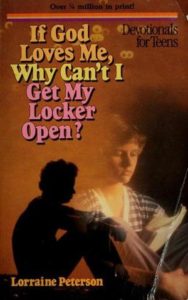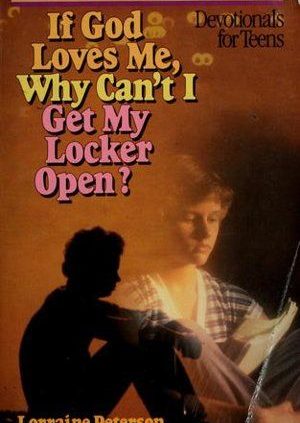If God Loves Me, Why
If God Loves Me Why?
If God loves me why can’t I get my locker open? That’s the title of a book that was published many years  ago, but the title has stuck with me. It brings up the practical and repeating question of Why? When things go terribly wrong in life, the question “why?” hovers around our mind, as we wonder what God’s love means in a practical way, in my situation. During a pandemic, the question of “why?” is huge. So, somewhere in your preaching in a pandemic you’ll have to address this question that won’t go away.
ago, but the title has stuck with me. It brings up the practical and repeating question of Why? When things go terribly wrong in life, the question “why?” hovers around our mind, as we wonder what God’s love means in a practical way, in my situation. During a pandemic, the question of “why?” is huge. So, somewhere in your preaching in a pandemic you’ll have to address this question that won’t go away.
This is the fourth in a series of posts on how to preach in a pandemic.
If God loves me why this disease?
 In his book, Where is God When It Hurts?, Phillip Yancey introduces us to a couple, John and Claudia Claxton, who ask this question, why. They were married in their early 20’s, and were excited about a long and productive life together. But within a couple of years they were faced with a life-threatening obstacle. Claudia was diagnosed with Hodgkins disease, a cancer that attacks the lymph glands. She was given only a 50% chance of surviving.
In his book, Where is God When It Hurts?, Phillip Yancey introduces us to a couple, John and Claudia Claxton, who ask this question, why. They were married in their early 20’s, and were excited about a long and productive life together. But within a couple of years they were faced with a life-threatening obstacle. Claudia was diagnosed with Hodgkins disease, a cancer that attacks the lymph glands. She was given only a 50% chance of surviving.
The first step in treatment was surgery to remove all obvious signs of the disease. Once her incision, which went from armpit to belly, began to heal, she began the radiation treatments that were required. This involved repeated broad exposure to Cobalt, a deadly radioactive ray that would hopefully kill any remaining cancer cells.
Radiation drained her of energy while it darkened her skin, caused the loss of her hair, and made her throat incredibly raw and swollen.
John and Claudia became angry with God. If God loves me, why did he let me get this horrible cancer? Why us? they cried out.
The Visitors
That’s about the time the visitors from church began to show up. The Claxtons hoped that these fellow believers would bring comfort and strength. Instead, they brought confusion.
The Deacon
A deacon made this suggestion about why this happened: “Surely there’s something in your life that doesn’t please God. Somewhere you must have stepped out of his will. These things don’t just happen.”
The Cheerleader
A woman from church took the role of a professional cheerleader. She brought flowers, sang hymns, and read positive, happy thoughts. But Claudia wanted to talk about how she felt abandoned by God, and this woman didn’t want any part of that kind of discussion.
The Faith-Healer
Another woman was a fan of faith healers that spouted their views on television. She came and told Claudia that sickness is never God’s will. All you have to do, she said, was to name the promise of healing, and in faith claim the victory, and you’ll be healed. Lack of healing was a sign of lack of faith.
Claudia tried it, but no matter how hard she tried, she couldn’t muster of faith in her pain.
The Faith Critic
A third woman from church came and told her that she needed to come to the place where she said “God, I love you for making me suffer like this…In all things, including this, I give you thanks.”
Claudia tried that, too, but all that came to mind was the grotesque picture of God as he was squeezing her between giant fingers until she would say, “I love you for doing this.”
The Pastor
The pastor of their church came and implied that Claudia had a chance to be one of God’s great martyrs. God chose her to suffer, and God would reward her eventually if she bore up under the pain and witnessed for him through it.
Many Possible Reasons
Who was right? Who was wrong?
There are many possible answers to the question, “If God loves me, why did this happen?”, including the one I mentioned in the last post, that much suffering is just the result of the whole creation being subjected to futility.
If God Loves Me Why This Mess?
 When things go wrong, we humans inevitably search for a reason “why”. These are several reasons that well-meaning Christians give in answer to the question, “If God loves me, why did this happen?”
When things go wrong, we humans inevitably search for a reason “why”. These are several reasons that well-meaning Christians give in answer to the question, “If God loves me, why did this happen?”
There are even those who suggest that God gave us this disease as a world-wide punishment for all the unfaithfulness that he sees in his world.
I want to suggest that as you preach through a pandemic, with people who are experiencing the fear of getting the disease, the pain of illness themselves, and the loss of people that they love, don’t try to give answers. Rather, be honest enough to say that we don’t know why in individual circumstances.
Of course, we do know that there are consequences for our choices, so that if you smoke three packs a day, you are likely to get lung cancer. If you drive drunk, you are likely sometime to get into an accident.
But for most situations, we can’t draw a direct line from God to the reason it happened.
So, what do we do? In the next post we’ll explore what it means to have ruthless trust.



